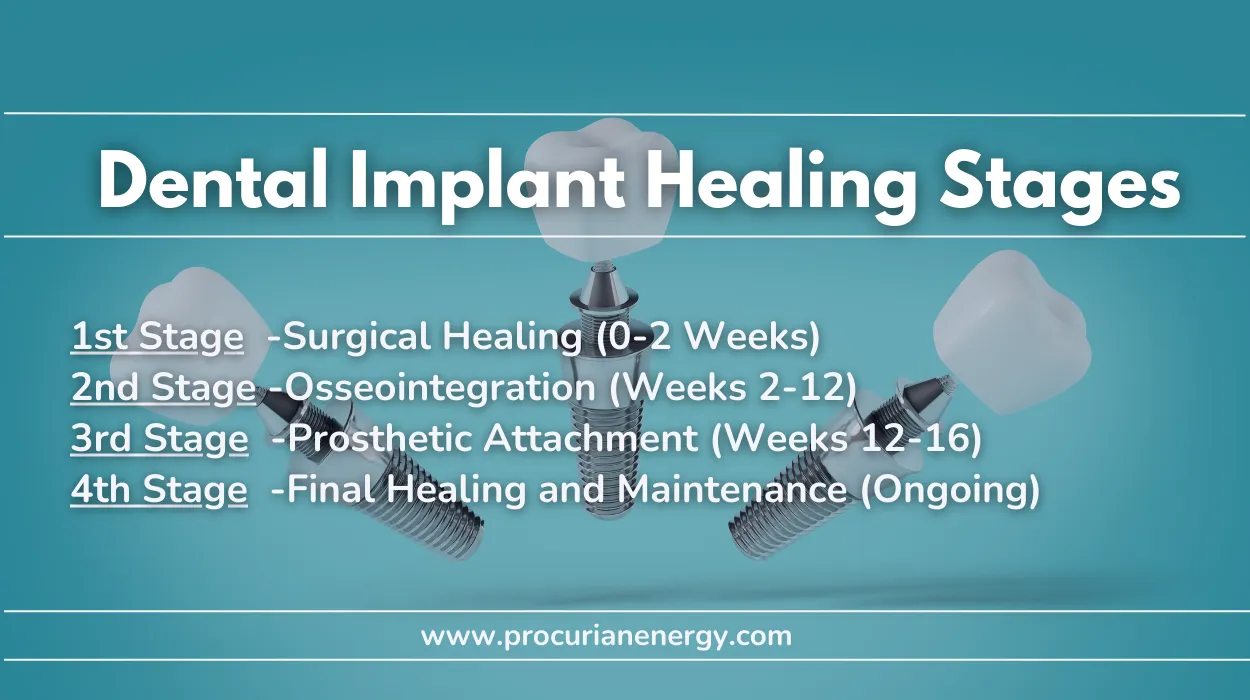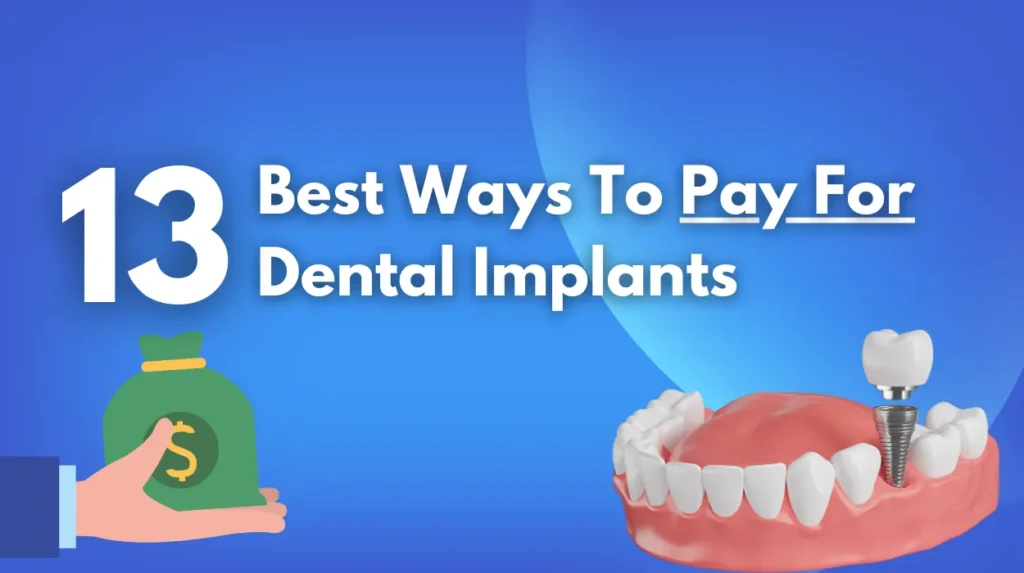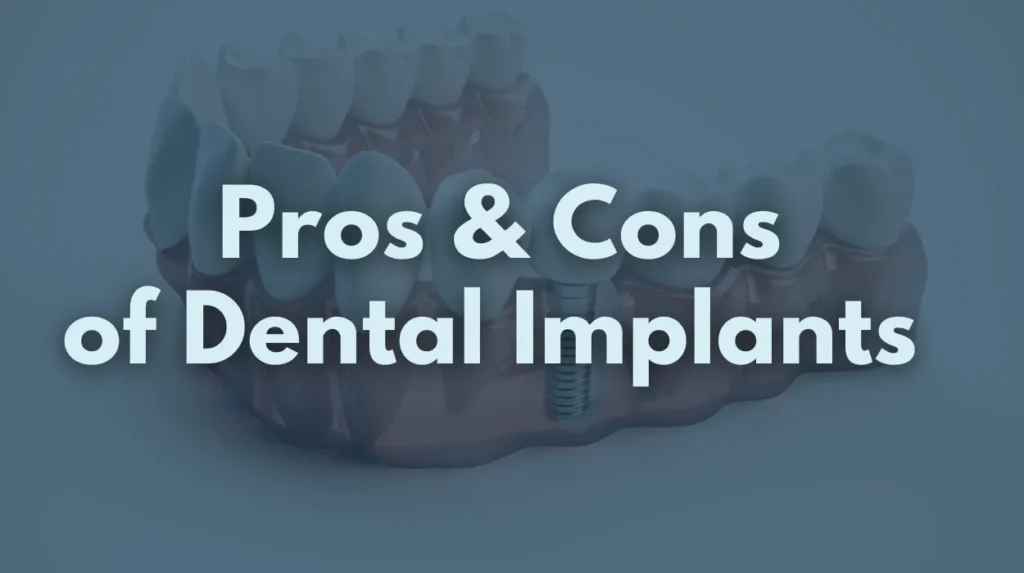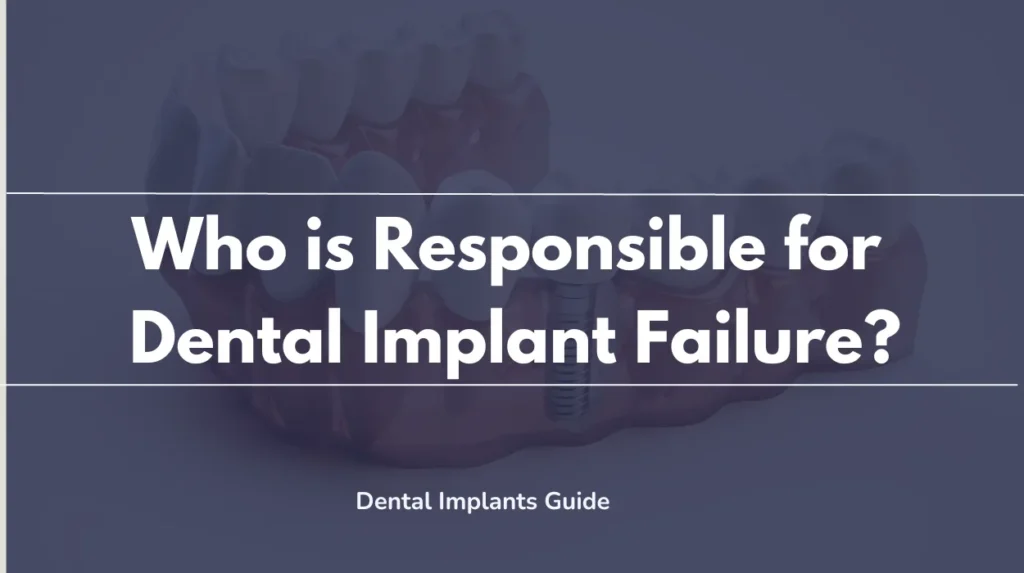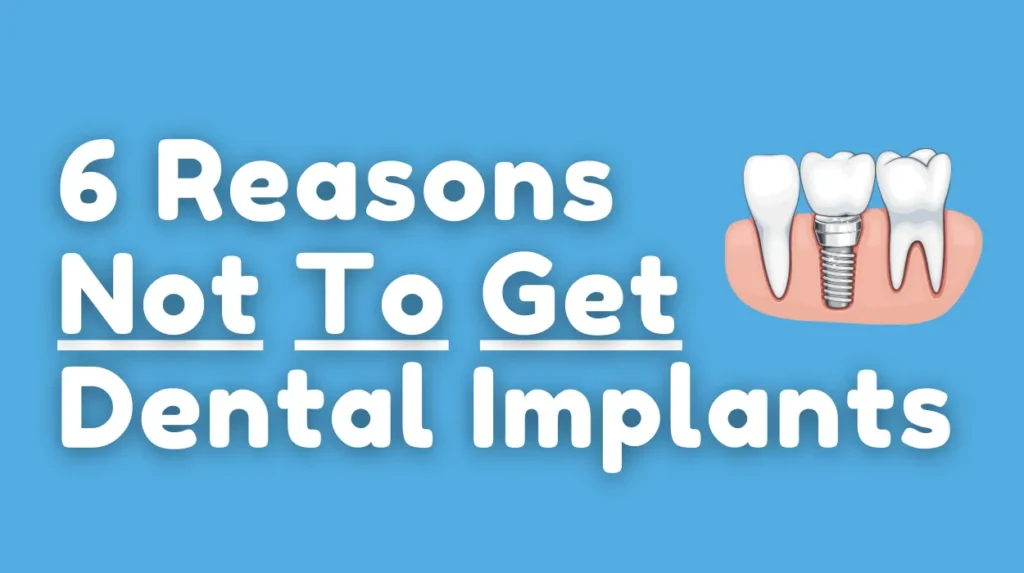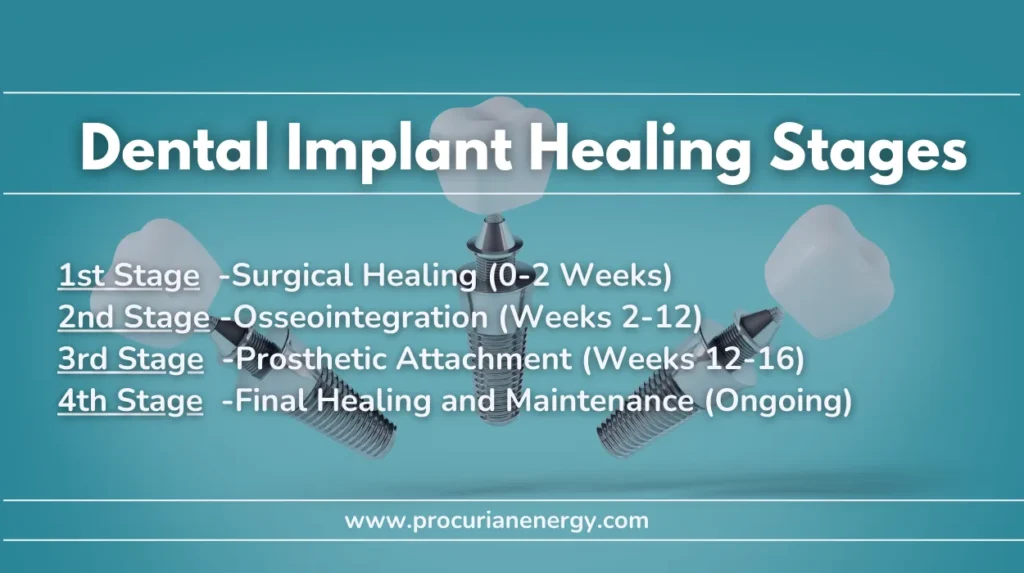
Hello there! If you’re reading this, chances are you’ve either decided to get dental implants or are curious about the process.
Well, you’ve come to the right place. In this article, we’re going to break down the dental implant healing stages in simple terms, so you know exactly what to expect on your journey to a healthier, happier smile.
What Is a Dental Implant?
A dental implant is like a replacement tooth root made of titanium. It’s surgically placed into your jawbone beneath the gum line. Once it’s in place, it acts as a sturdy foundation for a replacement tooth or a bridge.
There are different types of dental implants, each designed to serve specific purposes and accommodate varying patient needs.
4 Dental Implant Healing Stages
The dental implant healing process can be broken down into several stages. Keep in mind that everyone’s body heals at its own pace, but here’s a general overview of what to expect.
1st Stage: Surgical Healing (0-2 Weeks)
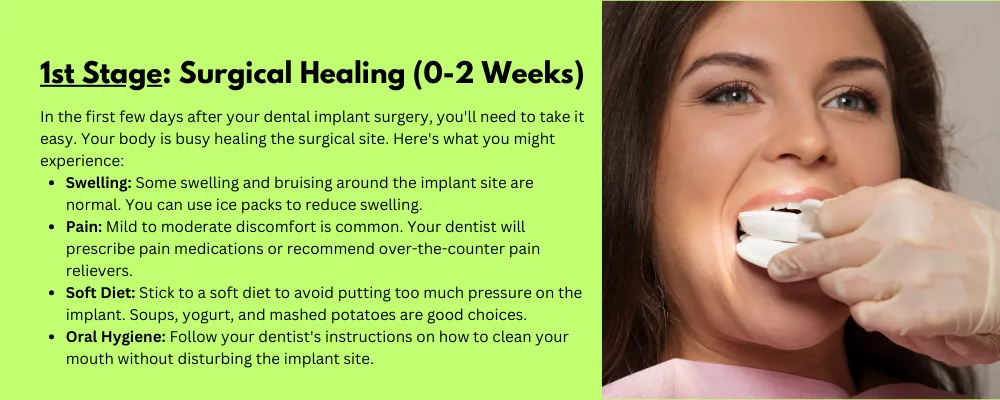
This is the initial stage where your dental implants are surgically placed into your jawbone. Don’t worry! you’ll be given anesthesia to keep you comfortable during the procedure, so you won’t feel a thing. The surgical site will be stitched up, and you’ll be sent home to rest and recover.
During this time:
- You may experience some swelling, bruising, and mild discomfort. Over-the-counter pain relievers can help.
- Stick to soft foods and avoid hot or hard foods that may irritate the surgical site.
- Follow your dentist’s instructions for oral hygiene and cleaning the area gently.
2nd Stage: Osseointegration (Weeks 2-12)
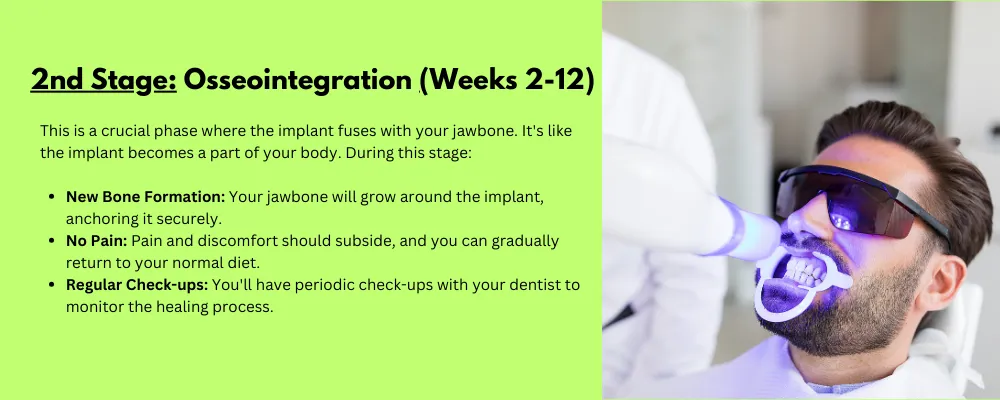
This is a crucial phase where the implant fuses with your jawbone. It’s like the implant becomes a part of your body. This stage is critical because it ensures the stability and strength of your implants. While you’re healing, the bone will grow around the implants, holding them firmly in place.
During this time:
- Be patient! Osseointegration takes time, so avoid chewing on the implant site.
- Continue with your gentle oral care routine as recommended by your dentist.
- Regular check-ups will monitor your progress, ensuring everything is going smoothly.
3rd Stage: Prosthetic Attachment (Weeks 12-16)
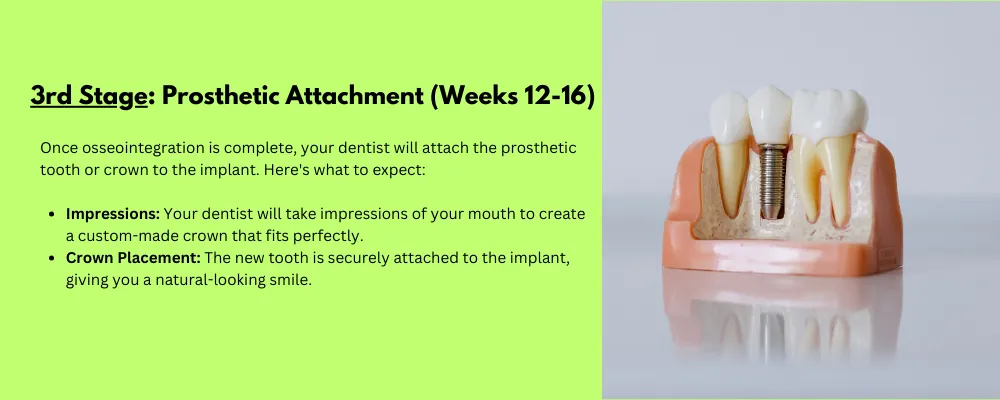
Once osseointegration is complete, it’s time for your dentist to attach the prosthetic, which can be a crown, bridge, or denture. They’ll make impressions of your mouth to create a customized replacement tooth that fits perfectly.
During this time:
- The prosthetic will be securely attached to the implant, restoring your ability to eat and smile confidently.
- Follow any dietary restrictions or care instructions given by your dentist.
- Enjoy your newfound confidence and smile!
4th Stage: Final Healing and Maintenance (Ongoing)
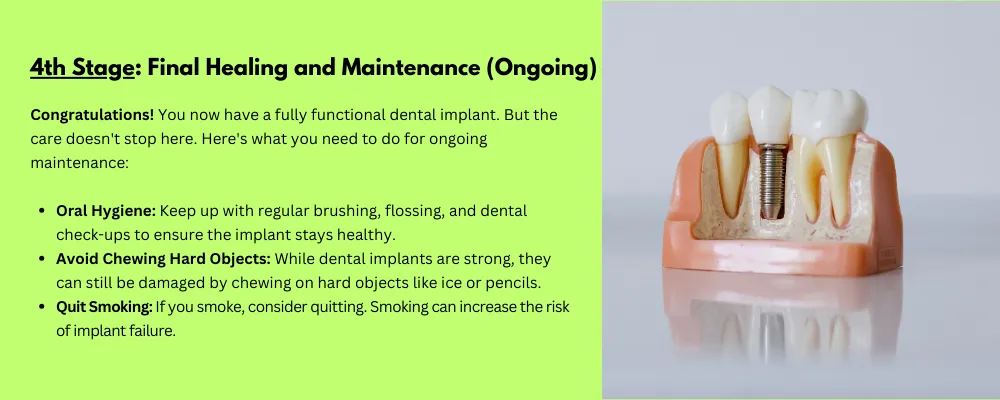
After the prosthetic is placed, you’ll still need a bit more time for everything to settle in. Your dentist will continue to monitor your progress to ensure that your implant is functioning correctly and that your smile looks fantastic.
During this time:
- Attend follow-up appointments as scheduled to ensure your implant is performing as expected.
- Maintain excellent oral hygiene to keep your implant and surrounding teeth healthy.
Potential Complications of Different Healing Stages
While dental implant procedures are generally safe and successful, it’s essential to be aware of side effects of dental implants. These can include:
- Infection – If you notice persistent swelling, pain, or discharge, contact your dentist immediately.
- Implant Failure – In some cases, the implant may not integrate properly with the jawbone. Your dentist will assess the situation and recommend a solution.
- Nerve Damage – Numbness or tingling in your lips, chin, or tongue can occur but is rare. It usually resolves over time.
Tips for a Smooth Healing Process
Now that you know about the dental implant healing stages, here are some helpful tips to ensure a smooth recovery:
- Follow your dentist’s instructions carefully. They are your best resource for a successful implant journey.
- Maintain good oral hygiene by brushing and flossing regularly to prevent infections.
- Avoid smoking, as it can hinder the healing process and increase the risk of implant failure.
- Stick to a soft diet during the initial healing stages and gradually reintroduce harder foods as directed by your dentist.
- Attend all follow-up appointments to monitor your progress and address any concerns promptly.
How long does it take for dental implants to fully heal?
The time it takes for dental implants to fully heal can vary, but it usually takes about 3 to 6 months. It’s like growing a strong connection between the implant and your jawbone, kind of like a friendship that gets stronger over time. Dental implants can last a really long time, often for your whole life!
How do i know if my dental implant is healing correctly?
You can tell if your dental implant is healing correctly by looking for these signs:
- Minimal Pain – Some discomfort is normal right after the surgery, but it should improve over time. If the pain gets worse or doesn’t go away, you should check with your dentist.
- No Infection Signs – There should be no unusual swelling, redness, or pus around the implant area. If you see these signs, contact your dentist as it might be an infection.
- Steady Healing – Your implant site should gradually get better, not worse. If things seem to be going in the wrong direction, it’s a good idea to consult your dentist.
How long does it take for gums to harden?
It usually takes a 6 to 8 weeks to a few months for your gums to get stronger and firmer.
But remember, everyone’s body heals at its own pace. It’s essential to follow your dentist’s instructions for proper care and give your gums the time they need to heal properly.
When does dental implant hurt the most?
Dental implants can hurt the most during the first few days after the surgery. This is because your mouth is healing, and there might be some swelling and discomfort.
Your dentist can give you medicines to help with the pain.
FAQs for Dental Implant Healing Stages
How long does the entire healing process take?
How do I take care of my dental implant after it’s healed?
What should I eat after getting a dental implant?
Can I go back to my regular activities during the healing process?
How long do dental implants last?
Final Words
Getting a dental implant is an a spectacle journey toward a happier, healthier smile.
Remember, while the process may take some time, the end result is a beautiful, functional smile that can last a lifetime with proper care.
Your new dental implant will be a long-lasting addition to your gorgeous smile with the right maintenance and persistence.
